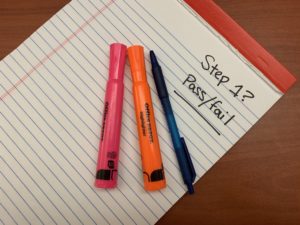Recently, the National Board of Medical Examiners (NBME) announced that the USMLE Step 1 exam for medical students will change its score reporting from a numeric score to pass/fail as of 2022. This news signals a substantial shift for medical education in North America and in particular the United States, as numeric Step 1 scores have been traditionally used to screen the most competitive applicants for physician residency programs. My hope is that the change in Step 1 scoring may lead to more holistic residency applications, as well as reduced medical student burnout when facing these life-altering exam scores. Unfortunately, the shift to pass/fail grading on Step 1 may have little impact on medical students’ tendency to prioritize the life sciences for their exams, while deemphasizing if not overlooking other, equally instrumental forms of medical knowledge: spanning ethics, social science, and humanities.
The AMA has recognized that Step 1 is the “No. 1 stressor” for medical students in the early years of training. This reality may be closely tied to burnout, a state of emotional and physical exhaustion from work and caregiving. Though burnout has been commonly identified in physicians, there is substantial evidence that medical students also experience burnout. The shift from numeric to pass/fail scored Step 1 exams may reduce the stress medical students feel about the exam. In turn, this change may improve their well-being at a time when they may otherwise be vulnerable to psychological distress. At the very least, the reduced emphasis on Step 1 scores may redistribute students’ stress, such that they are not preoccupied with their success on one exam.

As Brown University director of student and faculty development Emily Green has observed, many medical students feel that a poor Step 1 score signals a “closing door,” as a low score might bar them from successfully earning a spot in the most coveted residency programs. If an applicant hopes to place into highly-selective surgical residencies, for instance, the applicant depends on a high score to do so; without a strong performance on Step 1, the applicant may be obligated to apply to less competitive residencies in fields where they have little desire to practice. What will these highly selective and competitive residency programs do now to assess students? No doubt, they will resort to other metrics in order to select promising candidates, from marks in clinical rotations to the prestige of the applicant’s undergraduate and medical school institutions, or any extracurricular merits. That said, there remains an expectation that the removal of Step 1 numeric scores could lead to greater emphasis on more holistic measures of applicants’ potential.
Despite the positive potential of the USMLE Step 1 scoring system change, medical students and educators should nevertheless continue to reflect on the ways in which knowledge is prioritized for Step 1. In other words, even if a numeric score is not given, what do medical students choose to know (and subsequently ignore) in the course of their studies for the Step 1 exam? What topics are emphasized on the exam, and what topics does student folklore say are most important for Step 1? As my ethnographic research with medical students has revealed, medical students have overemphasized what they call “high yield” knowledge for Step 1. “High yield” information refers to those facts, concepts, and even entire subjects of study that medical students believe matter most for successful Step 1 performance. These usually include microbiology, pharmacology, physiology, and biochemistry, among other life science disciplines. Meanwhile, subjects that are not widely represented on the exam—bioethics and humanities, for instance—receive much less focus in medical students’ studies. Subjects not included on Step 1 are deemed less instrumental, as they will not result in success on the exam that is the assumed gatekeeper to a “great” residency.
Even as the Step 1 exam moves to a pass/fail format, students will no doubt continue to make these decisions about what knowledge matters for the test, and what knowledge can be spared. After all, as Howard S. Becker and colleagues’ classic study Boys in White first acknowledged, medical students cannot possibly know everything there is to know in biomedicine. Tough choices need to be made. Some knowledge will fall to the wayside, no matter how instrumental exams are scored. In light of this, educators and ethicists should encourage medical students to be mindful of the choice they make around knowledge, as well as the pitfalls of ignoring concepts that do not strike them as test-worthy. While it may be safe in medical school to miscalculate what matters, these same mistakes can put patients in harm’s way once students graduate onto the wards as interns and residents. Ethics, health disparities knowledge, cultural humility, and communication skills matter not because they are central to Step 1, but because they have serious implications for delivering high-quality, socially conscious care to patients.
Medical educators, bioethicists or otherwise, should listen closely to medical students’ concerns, fears, and stresses as they progress through training. If not Step 1, what other hurdles do students face that will impact their mental health, well-being, and ability to flourish as future physicians? Educators should also be mindful of the choices medical students make around knowledge, and to what end. Similarly, medical students should be critical of their own decisions around knowledge, especially in regards to high stakes exams. USMLE Step 1 may become pass/fail, but it might remain the standard medical students apply to decide what knowledge is most valuable. Perhaps the next iteration of Step 1 will incorporate these less measurable skills, not because testing them will be definitive, but because having them on the test will indicate to students that they are important areas of learning. Going forward, bioethicists, medical social scientists, and medical humanists can play an important role in these conversations, and help medical students navigate the complexities of assessment and knowledge-building.